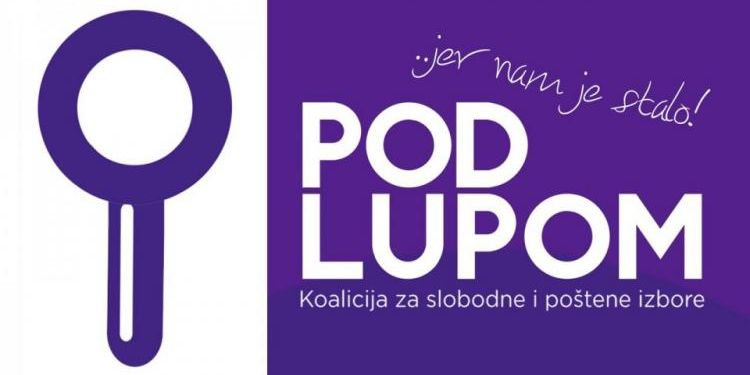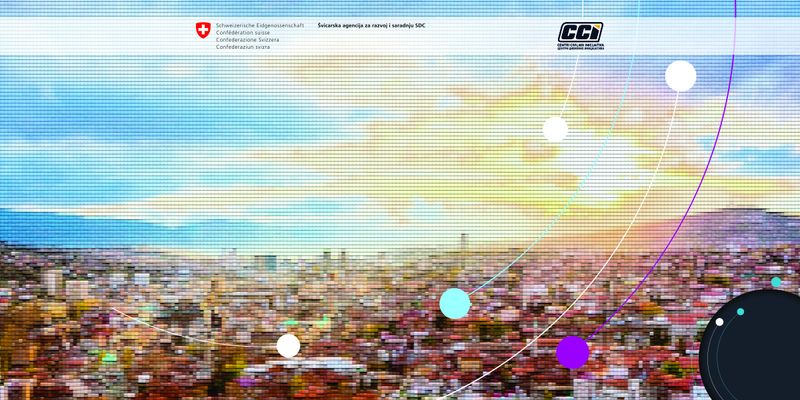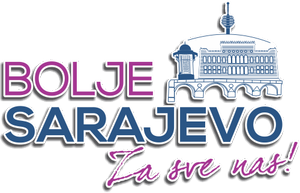Sva izdanja
Issue XXXV, October 2013 - December 2013
Issue XXXIV, July 2013 - September 2013
Issue XXXIII, April 2013 - June 2013
Issue XXXII, December 2012 - Mart 2013
Issue XXXI, September - November 2012
Centri civilnih inicijativa - pokreću 7 lokalnih kampanja
Plastične kese i zagađenje životne sredine - Rezultati foto konkursa
Obilježavanje dana planete Zemlje u BiH
Nagradni foto konkurs CCI za izbor najboljih fotografija
CCI published the results of monitoring the work of executive and legislative authorities in BiH. CCI monitors the work of the governments and parliaments at all levels of the authorities in BiH and publishes the reports on a quarterly basis. The best indication of the situation in which BiH is currently in, is the fact that even one year after holding the elections the authorities have not bee formed at the state level; how the parliaments and the governments at the state and entities levels worked you can find out in the text below. These activities are financially supported by USAID.

During October, Centres for Civic Initiatives (CCI), with the support of the Council of Europe, started comprehensive activities on initiating, monitoring and contribution to the amendments to the electoral legislation of Bosnia and Herzegovina, and especially of BiH Elections Law itself. The purpose of these activities is a focused contribution to the work of the Inter-ministry working group for amendments to BH Election legislation, which group is comprised of the representatives of both homes of BH Parliament, BH Council of Ministers and the Central Election Committee, with the CCI, as an observer.
In these program activities, CCI will primarily focus on the implementation of a comprehensive analysis of observed anomalies within BiH Election Law. During November and December CCI will organize one conference and a number of focus groups at the local level, in order to inform the professional, political, and broader public about the results of the analysis, and in order to make its own contribution to the improvement of final recommendations that will be forwarded to the Inter-ministry working group for consideration and for its inclusion in the text of the amendments to BH Election Law.
It is a transparent intention of CCI to advocate a more transparent process of reform of electoral legislation, with maximum inclusion of the civil society, academic community, media and the general public.

Accountability forums – occasion for the citizens to talk to the representatives of local authorities. This year Centre for Civic Initiative also organizes Accountability Forums in the municipalities covered by the project, as a part of the project Local Administration for the Quality of Life of Citizens – phase 2, funded by the European Union. At these public meetings with citizens, the municipal mayors, together with their associates, inform the citizens about the level of realization of the municipal projects in the past and the plans for the future, and give the present citizens answers to the questions about current problems in their communities. The first in a series of Accountability forums was held in Travnik at the end of September, and after that Novo Sarajevo, Široki Brijeg, Doboj, Bijeljina, Foča followed.
In Travnik the citizens asked about 20 questions and all of them were answered, while the representatives of the local authorities also assumed the obligation to answer some of them in writing to the citizens who asked them. The central problems of the municipality of Travnik are the price of heating and the obligation of the citizens towards the company Unis energetik and that is that they pay 40% of the price of heating whether they use it or not which is explained by the fact that the pipes pass through apartments. They also pointed out at the problems of stray dogs, parking lots and roads in the town as well as transportation and disposal of waste.
In Novo Sarajevo mayor Nedžad Koldžo first had to answer the question to what extent the key elements of the plan for the year 2011 given in 6 key points at the last Forum were implemented. After that the Mayor presented the plan for the period to come, and answered a number of questions asked by about 70 present citizens.
At the Accountability Forum held in Doboj, the first half hour the Mayor talked about his past work and the plans for the next year of his term. After his presentation, the citizens submitted numerous questions in writing and it was not possible to answer all of them by the end. The most frequent questions were related to non-payment of the promised scholarships, disorder of children's playgrounds and kindergartens, the state of the landfill in the vicinity of the town and its influence on the health of the people, sale of the business premises owned by the Municipality and so on. However, the most important feature of this Forum might be the fact that this was the first time in the last 3 years that the mayor Obren Petrović publicly met with the citizens.
Before about hundred present citizens, the introductory presentation of the Mayor of the Municipality of Bijeljina began with the presentation of the realized against planned activities, which were mainly related to larger projects such as sewer, gasification, heating system, construction of the Cultural centre, etc. Many of the promised projects have not been completed yet. Only 130 km out of the promised 260 km of the gas pipelines were built, and the heating system has not been started yet. The Mayor announced the signing of the contract for the first borehole for exploitation of hot water. According to the Mayor, the biggest problem of the gasification project is to conduct the gas from the main pipeline, and the Municipality is hoping to reach an agreement with the RS Government on that issue.
The representatives of the local authorities were asked two questions by the organizer: the first one regarded transparency of employment of trainees in the municipal administration, and the second one the problem of emission of unpleasant odors from the area of the ''Eko-dep'' landfill in the summer, and a number of other problems related to this company. The main observation regarding the first question referred to the lack of transparent process of employment of trainees in the local government bodies and to nondisclosure of the ranking list after completion of the competition.
Then ensued the questions of the citizens of whom more than 70 were present. One of them referred to solving the existing problems of local communities, including the problem of the status of local community and its competences, i.e., bad solutions provided by the Law on Local Self-government of the RS. A number of questions and comments referred to sport, especially in terms of how it is possible that with such a percentage of budget allocation for sport Bijeljina cannot boast of a single club in the highest rank of competition, i.e., why the quantity rather than quality is financed. The Mayor's response was that the Municipality favors financing as many clubs in smaller amounts, expecting that quality will emerge from quantity. This issue was left for further debate in this municipality, and it will be the topic of the budget focus groups, which will be organized within this project during the public discussion on the draft municipal budget.
Other issues were mainly related to the problems of city infrastructure, such as parking space, insufficiently regulated city park, the lack of public toilets and drinking fountains, etc. The Forum lasted 90 minutes, a complete video can be viewed at CCI youtube channel:
http://www.youtube.com/watch?v=6zicr32-X34
Mayor of Foča, Zdravko Krsmanović, after short prezentation of his annual plan implementation, spent 60 minutes to answer questions collected from more than 100 present citizens. Forum started with moderator's request for comparison of planed with implemented activities for past period. Questions of citizens were very concrete, and for some crucial infrastructural problems, like problem of septic waste in one part of Foča town, Mayor apointed field meetings with citizens a few days after Forum,
Local and regional media reported on this event and listed topics, but also media from neighbouring Montenegro.
The next Forum will take place on November 24 with the mayor of Pale, Slobodan Savić, and forums are expected soon in Banjaluka, Mostar, Trebinje, Zenica, Livno and Bihać.
As part of the project Reducing the Use of Plastic Bags in BiH, CCI, in partnership with CRP Tuzla, organizes promotional stands in bigger BH towns, in order to collect the citizens' signatures as a support to adopting the legislation that should regulate production, trade and import of plastic bags, all aimed at environmental protection. These activities were supported by the Delegation of the European Commission in BiH.
The first two of planned stands were organized in Mercator centers in Sarajevo and Banja Luka, on 29 October and 05 November 2011. The citizens who refused a plastic bag and signed a petition could win an appropriate bag for repeated use. Citizens showed great interest, they accepted the ideas of this action with approval. Although most citizens take a big number of plastic bags from supermarkets rather than carrying their own from home, their comments were mostly positive and they said that the plastic bags were not really their choice, that they were aware of bad habits and that this area should be somehow regulated, even if it required banning of plastic bags. Stands were visited, as citizens, i.e. buyers, by the famous writer Abdulah Sidran, Borislav Borenovic, a member of PDP in the RS National Parliament, and Dusanka Majkic, a member in BiH Parliament who also gave her signature for the reduction of use of plastic bags.
Both stands attracted interest of entities' ministries that were in charge of ecology, i.e. environment. The minister Srebrenka Golić said that the Ministry For Spatial Planning, Construction and Ecology, after the initiative that came from CCI, immediately started coping with this, among others, ecological problem. The solutions that are currently being analyzed will certainly go in the direction of protection of the environment, by introduction of the fees according to the principle „paid by the pollutant“, as well as by introduction of the incentives for those that will produce bio-degradable bags, better quality, i.e. thicker plastic bags and those that develop new technologies.
The activities are currently focusing on the development of the regulations in the form of a rule, that should be released by the New year as a draft, after which it will be considered by the Working Group for Selection of the Model for Solution to the Problem of Plastic Bags in BiH. This working group is composed of the representatives of competent ministries, ecologists, of the NGO sector; there is also an effort to include the producers in the process, in order to reach a solution that will be acceptable for all the interested parties.
During November stands will be held in Tuzla, Bijeljina, Mostar and Trebinje too. The intention is to get as big support of the public as possible, and the first reactions are more than positive, which is shown by a big number of comments on BH web portals. A web site www.plasticnekese.NEt, was also launched, on which it is possible to sign an online petition, upload photos showing the pictures of polluted environment.





Week of civil participation commemorated in BiH. In this year too, the organizer of this event, CCI prepared a number of the activities by which it promoted the importance of citizens' participation in decision-making processes at the local level, as well as the needs for better communication between the selected representatives and the citizens. In five cities throughout BiH street stands have been held, in which the citizens could present their questions in writing and also talk to the representatives of the authorities. These activities are carried out in parallel in 17 countries of the Central and East Europe, within CEE CN network.
The organizer of Citizens Participation Week in BiH was the Center for Civic Initiatives. Our plan was to organize the so-called CCI Caravan. In five biggest towns in BiH – Bijeljina (19.09), Tuzla (20.09), Sarajevo (21.09), Mostar (22.09) and Banja Luka (23.09) we organized street stands (in period between 11.00 and 14.00 hours) in which we promoted Citizens Participation Week (giant posters and other printed materials which we distributed to the citizens) and invited citizens to ask the questions, in written, to the local government representatives. We created also a very big book, where citizens could write down their questions and suggestions. All those questions will summarized by the CCI, and part of them (in accordance with the minimum criteria) will be sent to the local authorities and placed on our web site. CCI will send back the expected answers to the citizens who ask them – in the way that is available, in accordance with the contact information that citizens left.
Local authorities were informed in proper manner about our intentions and plans. On the addresses of competent services in five towns we sent written request for permissions to use a public territory, and to put up the stands. Additionally, to avoid one way communication, we timely sent the invitations to the presidents of the local parliaments, mayors and heads of local political parties in local parliaments, and invited them to come to our street stands and take the opportunity for direct communication with the citizens in their towns, and to additionally promote cooperation among citizens and local authorities.
Finally, in order for these events to be carried out properly to the end, we sent information to the printed and electronic media about the CPW in BiH, and also a press release. Beside that, CCI used our own database, and sent information/newsletter about these activities, to more than 400 addresses of our activists, and also to more than 100 journalists and media.
The main results achieved,
- 151 questions and / or suggestions from citizens to local authorities in five cities entered the book that was opened during CCI' street events.
- 20 media have reported on street stands in towns (approx 60 min program - on the TV about 30 minutes and about 30 minutes on radio stations + 5 articles in the newspaper and web site)
- 12 representatives of government responded to the invitation to come to CCI' street events (Tuzla - Mayor and two Councilors, Sarajevo - Deputy Mayor of Sarajevo, Mayor Advisor Novo Sarajevo, Baja Luka - President of the City Assembly and five members from different parties)
- Created a basis for further communication by the CCI for citizens and local government on the processing issues that citizens put in the book on the street stands

CCI initiatives accepted by the municipalities Vlasenica and Milici. After training of the Working Development Groups in Vlasenica and Milici, the new municipalities in which the Centres for Civic Initiatives , as of the beginning of this year, started implementing the component “Citizens’ Participation in Decision-Making Processes” which is a part of the project “Reconciliation and Development of Communities/Participatory Democratic Development in 4 Municipalities of the Birac Region 2011 – 2013", the initiatives for adoption of new participation mechanisms were created and sent to municipalities. These activities are implemented by the CCI with the support of the associations Priroda (Nature) and Caritas, and are financially supported by the Swiss Agency for Development and Cooperation SDC, as well s by the Government of Lichtenstein.
The working development groups, composed of the representatives of the Municipal Administrative Service and Local Communities, initiated, with CCI’s support, in Milici municipality, the adoption of the mechanism according to which the public debates will have to be held on all relevant issues, and, after holding the Municipal Assembly sessions, an obligation to develop an information leaflet. WDG, together with the OSCE, initiated the adoption of the decision that lays down the obligation of the councilors in the local assembly to make themselves available to the citizens in local communities according to a set schedule, in order to hear their questions about the issues related to their community which they would delegate at the MA session, and to be informed by the councilors about the work of the Municipal Assembly.
The initiatives were accepted by both municipalities, and then incorporated into the Municipal Assembly agenda; after that the decisions were adopted in Milici on 27th October and in Vlasenica on 1st November 2011.
As part of this project segment, CCI also works with the Project Development and Application Team, the forming of which attracted great deal of interest by municipal officials as well as of direct participants, i.e. representatives of the municipalities. Its forming, training and capacity-building, through direct CCI monitoring, aim at both joint and individual application of projects in municipalities, toward the main and EU donors, in the interest of four municipalities included in the project.
So far the DAP team has held meetings in Zvornik, Banja Luka, Vlasenica and Milici. The CCI’s activities on training of the Team have resulted in selection of the project ideas, that will be sent to potential donors. For the area of the municipalities Milici, Vlasenica and Bratunac, a project idea of free Internet for the city area was selected, while in Srebrenica the project idea – the Center of Knowledge was selected, in which the interested persons will be able to learn foreign languages.
CARITAS and AW Priroda were CCI’s partners on this project, which was financed with the support of the Swiss Government (Swiss Agency for Development and Cooperation, SDC) and the Government of Lichtenstein. Besides the municipalities Vlasenica and Milici, municipalities Srebrenica and Bratunac were also included in the project.Results of the analysis of Job Vacancy announcements published – CCI determined that the law is violated by even 34% of employers in the public sector. In August and September CCI carried out a survey of 344 job vacancy announcements in order to determine which documents were required for application. The employers burden those who apply for a job by asking them to provide numerous documents that have to be paid by the people who are out of job anyway.
In that, a requirement that the candidates should provide a certificate on non-conviction is against the law, because it is contrary to the provisions of the Law on Protection of Personal Information. Even 34% of employers in public and 7% in private sector are in breach of the mentioned law. The survey showed that one of the preferable requirements posed by the employers from the private sector was that the candidate should have working experience, should speak a foreign language, use computer, have good communication skills, have skills in analysis and planning. In the public sector the employers are a little more interested in working experience and very little in computer literacy. Knowledge of a foreign language, communication skills, team work are almost insignificant qualifications in the public sector, when it comes to the selection of the candidates for a position. The entire analysis is available for viewing at www.ccibh.org under section publication, for now only in the local language.
Survey on necessity of introduction of periodical subscriptions on Sarajevo – Kakanj highway developed by the CCI. BiH is the only country in the world that applies the system of collection of tolls by sections, without offering the subscription tickets. BiH citizens are already burdened enough with the various dues for construction and maintenance of roads, through retail price of fuel and oil products, various fees through registration of motor vehicles, payment of toll, etc. This survey provides a comparative insight into the ways of solving this problem both in the country and in the region– Croatia, Serbia and Slovenia. This document is available at www.ccibh.org under the section publications, for now only in the local language.
A coalition of civil society organizations formed in Banja Luka under the name „Re: akcija – Građanska inicijativa za Banjaluku“. At the beginning of October ten organizations active in this city signed the founding charter in which they committed to strengthening the cooperation between the citizens, civil society organizations and the authorities both at the local and at higher authorities level.
The coalition was formed so that the organizations that have associated could work more easily on making the needs of the citizens heard at the time when the decisions at the local level are made. The coalition also obliged itself to initiate the critical thought and to foster social actions of both the individuals and the groups of citizens in Banja Luka. One of the first actions will be to be actively involved in drafting the city budget for 2012 and in creation of the partnership with both other organizations and the individuals at the local level. Initiating joint actions will be based on real needs and interests of citizens, founded on the surveys and situation analyses, rather than on assumptions.
The invitation to join the coalition is open for other organizations too that share the same values, mission and vision.
The following organizations are the members of this coalition:
- Centres for Civic Initiatives;
- Agency for Development and Cooperation CEREBRA;
- Center for Development of the Young and the Community Perpetum mobile;
- Center for the Environment;
- Helsinki Parliament of Banja Luka citizens;
- Youth Communication Center;
- Transparency International;
- Association of Citizens Agrarni informacioni centar;
- Association of Citizens Oštra nula;
- Association of Citizens Tender.
Report of non-governmental organizations on the implementation of the Strategy for Justice Reform in BiH adopted at the Conference of Ministers. The report states that, despite pronounced political tensions in BiH justice sector, in the first six months of 2011, a certain progress was noticed in each of five strategic fields of the Strategy. In order to make sure that the implementation of the Action Plan of this Strategy runs more intensively, the civil society organizations made certain recommendations. These activities were financially supported by the Embassy of the Kingdom of Great Britain, AECID and SIDA.
In addition to CCI, Association of Democratic Initiatives ADI, Helsinki Committee, Your Rights and Bureau for Human Rights Tuzla are included in the process of monitoring and evaluation of the implementation of the Strategy for Justice Reform in BiH.
In their report these organizations state their expectations that reform processes would intensify in BiH, which will contribute to a more significant progress in the sense of the implementation of the Action Plan. The recommendations relate to a more efficient implementation of the Strategy, aiming at, amongst other, the capacity building of the institutions in the justice sector in terms of human resources as well as in terms of their capability of meeting the needs and the requirements, education of the existing employees and hiring new employees with relevant competences. It is also necessary to adopt the financial plan for the implementation of this Strategy, as well as the evaluation of allocation of those funds, on the basis of which the budget resources for the said institutions will be proposed, to the end of securing necessary funds for further implementation of the Strategy. Having all the aforementioned in mind, the institutions of the justice sector, in cooperation with the Spanish Agency for International Cooperation and Development (AECID), the Swedish Agency for International Development and Cooperation (SIDA), and the United Kingdom Government, have finalized the activities on establishing the common donors' trust for the implementation of the SRPS, which will, quite certainly, help in overcoming the problems of lacking budget funds for the implementation of this important strategy.


















